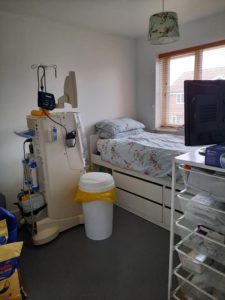Home Haemodialysis: could it work for you?
Would you like to have dialysis at home? It might be easier than you think! There are no age limits or specific health requirements. You just need to be stable on dialysis and learn how to operate the machine and care for yourself, or have someone committed to doing it for you.
What are the benefits of home dialysis?
You can dialyse in the comfort of your own home.
You have independence and freedom to fit your treatments around your lifestyle, which is beneficial to your mental health.
There will be fewer hospital visits, no travelling time, no waiting for transport or a machine to become available. You will have more time for things which are important to you, like family and friends. You may be able to return to work or work full-time if you wish, which brings financial benefits.
Importantly, you should feel better. In-centre dialysis only offers an average of 12 hours treatment a week. At home, there is the option to dialyse longer/with more frequency, offering longer life expectancy. Patients often recover more quickly after dialysis at home than in centre.
Many home dialysis patients take fewer tablets, have fewer stays in hospital and experience better health, generally.
Here are some commonly asked questions:
What machine will I use?
Most patients will have a standard hospital machine that is used on the unit, such as a Fresenius one. It requires plumbing to a water supply, a water softener and a Reverse Osmosis Unit, commonly known as an ‘R.O.’
This is to ensure the water is pure and not too hard on the machine elements. Some units offer the smaller NxStage or similar, which doesn’t need to be plumbed in.
I don’t own my home. Could I have home dialysis?
Yes. Most patients living in social housing or privately rented property can still have home HD.
I only live in a small flat. Is it too small?
No. In most cases, dialysis is still possible. A nurse will visit your home to assess your options.
Is it expensive?
No. It shouldn’t cost you anything. The hospital will supply the machine, all the medical equipment and usually, a chair. Most hospitals now reimburse patients fairly for water and electricity usage. You may want to buy storage equipment and will probably need a set of digital weighing scales but some units provide these.
I live on my own and there’s no-one to do my dialysis. Could I do it myself?
Yes, it is possible. If your training goes well, you and your nurse will feel confident about you being self-caring. Then, when you are willing to take on the responsibility of your treatment, home dialysis is available to you.
How long does the training take?
The training is available for as long as you need it. There is no rush. Some patients train for several months, others are ready within 2 months.
Will I just be left on my own at home?
Of course not. The home therapy team will be on hand to support you; and your bloods will be collected from home as frequently as they would be taken in-centre. You will still have clinic appointments with your doctor too, just to make sure you are keeping well. Dialysis machine technicians will service your machine at regular intervals to keep it in its best condition.
Will I still be on the transplant list?
Dialysing at home has no effect on your status on the transplant list. You will not be forgotten!
Home dialysis isn’t for everyone. Some people feel safer in a hospital setting and some patients like the social aspect of seeing other people regularly for a chat. If it is something you would like to know more about, talk to the nurses on your unit or your consultant.

Last Reviewed on 29 May 2024
